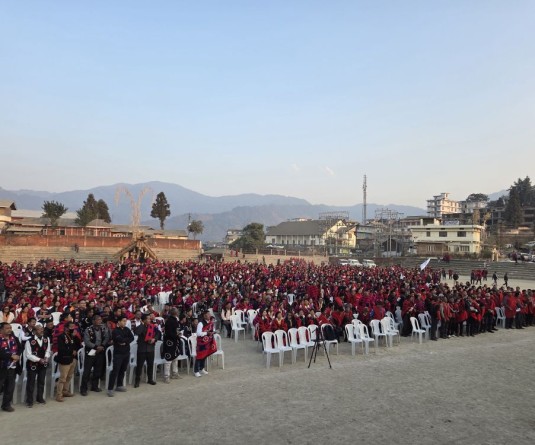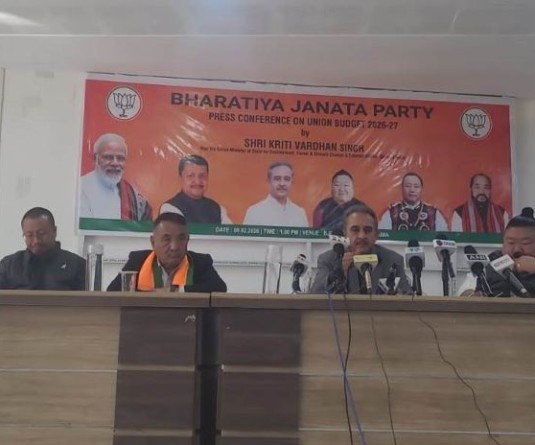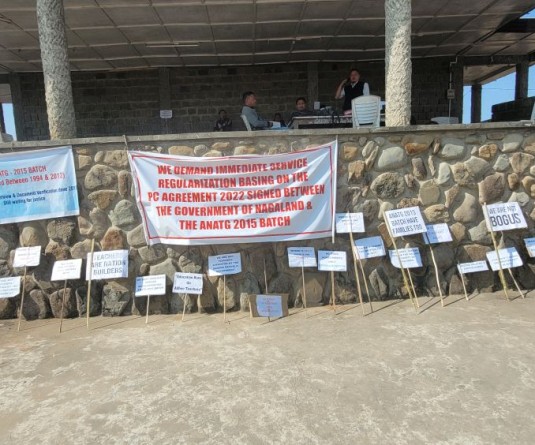Resource persons and officials during the inaugural programme of national seminar held at the Nagaland University, Kohima Campus, Meriema on April 21.
Kohima, April 21 (MExN): The inaugural programme of national seminar on ‘Social Transformation in India 2.0 and National Education Policy (NEP) 2020’ was held at the Nagaland University, Kohima Campus, Meriema on April 21.
The two-day seminar is sponsored by the Indian Council of Social Science Research and organized by the Department of Teacher Education (DTE), Nagaland University, Kohima Campus, Meriema, stated a DIPR report.
Member, NEP Committee and Vice-Chancellor, Mahatma Gandhi University of Horticulture and Forestry, Chattisgarh, Prof Ram Shankar Kureel while delivering the keynote speech highlighted the vision of NEP 2020.
He mentioned that NEP aims to establish an education system that contributes to an equitable and vibrant knowledge society by providing high-quality education to all, developing a sense of respect towards the fundamental rights, duties, and constitutional values, etc., and to instill skills, values and dispositions that support responsible commitment to human rights, sustainable development and living, and global well-being.
Key principles
Prof Kureel said the key principles of NEP 2020 are - respect for diversity and local context in all curriculum, pedagogy, and policy; equity and inclusion as the cornerstone of all educational decisions; encouragement and facilitation for philanthropic, private, and community participation; use of technology in teaching and learning; removing language barriers for Divyang students, and in educational planning and management; emphasize conceptual understanding rather than rote learning; recognizing and identifying unique capabilities in each student; to encourage logical decision making and innovation; and continuous review based on sustained research and regular assessment by educational experts.
Director, Department of Higher Education, Government of Nagaland, Dr Katoni Jakhalu said, “Whether we are ready or not, we are at the threshold of tremendous changes, especially in the education sector.” Highlighting the State’s higher education, she stated that a task force was constituted to make a recommendation for the implementation of the policy.
She said that to create awareness, seminars and workshops were conducted online and offline and attempts were made to spread awareness about the guidelines of NEP 2020 in different local Naga languages, but so far only Tenyidie has completed the translated version.
Key areas and agenda
When it comes to key areas and agenda on equity in NEP 2020, Dr Katoni stated that the State is well balanced in gender parity; in higher education female student enrollment for the last two years are more than their male counterpart.
She stated that so far out of 69 affiliated colleges under NU, 40% are NAAC accredited. She said that the State’s policy is to establish at least one government college in each district, tuition fees are subsidized and proper facilities, smart classrooms, digitalized libraries are provided to ensure that no one is left out in digital learning and technology, but with the creation of five new districts, she stated that the task ahead is a challenging one.
She maintained that huge gaps and perplexing challenges are ahead but as long as there is dialogue and exchange of ideas, the education sector of the State will progress with the rest of India.
Pro Vice-Chancellor, Nagaland University, Prof AK Mishra said for the social transformation of the country, equal opportunities need to be provided for which education is fundamental. He added that teachers have an important part to play in the successful implementation of the NEP 2020 policy.
Dean, School of Humanities & Education, NU, Prof Buno Zetsuvi said NEP 2020 envisages a great social change by transforming the educational system, however, she expressed concern that ‘India being a diverse country it will not be possible to bring one whole relevant, perfect, acceptable policy suitable for the entire country.’
The Prof added that flexibility and adjustments without disrupting the main aim of the policy are required.





.jpg)
